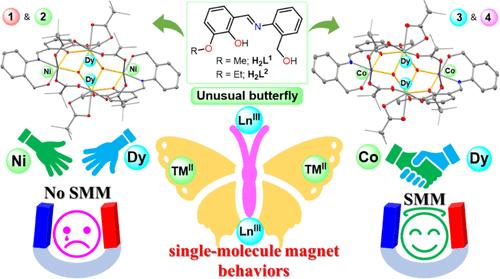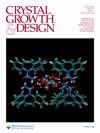Impact of 3d Metal Ions on the Magnetic Dynamics in Isostructural Tetranuclear Butterfly {Ni2IIDy2III} and {Co2IIDy2III} Complexes
IF 3.2
2区 化学
Q2 CHEMISTRY, MULTIDISCIPLINARY
引用次数: 0
Abstract
This paper describes the synthesis, structures, and magnetic properties of four isostructural butterfly-type heterometallic tetranuclear 3d-4f complexes, [Ni2Dy2(HL1)2(μ3–OH)2(piv)6]·2CH3CN (1), [Ni2Dy2(HL2)2(μ3–OH)2(piv)6]·2CH3CN (2), [Co2Dy2(HL1)2(μ3–OH)2(piv)6]·2H2O (3), and [Co2Dy2(HL2)2(μ3–OH)2(piv)6]·2CH3CN (4), derived from two closely related Schiff base ligands H2L1 and H2L2 in the presence of pivalate (piv) ions. X-ray crystallographic studies of 1–4 revealed that all of the complexes are constructed with a type-II butterfly core in which DyIII ions are located at body positions, while the 3d metal ions (NiII and CoII) occupy the wingtip positions. It is noteworthy that all reported systems containing NiII and CoII have been isolated as type-I butterfly structures, with only one report each on the Ni2IIDy2III and Co2IIDy2III type-II butterfly core systems, which have been both structurally and magnetically characterized. Direct current magnetic susceptibility measurements performed on 1–4 revealed that the susceptibility response is dominated by the depopulation of Stark sublevels of the DyIII ions and the ZFS of the CoII cations in the case of 3 and 4 and the weak intramolecular superexchange interactions have been calculated by means of CASSCF and CASSCF/NEVPT2 calculations. Dynamic magnetic studies revealed that only CoII analogues (3 and 4) display single-molecule magnet behaviors in which the additional anisotropy of the CoII centers is responsible for the occurrence of the out-of-phase response in contrast to 1 and 2 with poorly anisotropic NiII cations.

3d 金属离子对等结构四核 Butterranuclear {Ni2IIDy2III} 和 {Co2IIDy2III} 复合物磁动力学的影响
本文介绍了[Ni2Dy2(HL1)2(μ3-OH)2(piv)6]-2CH3CN (1)、[Ni2Dy2(HL2)2(μ3-OH)2(piv)6]-2CH3CN (2)和[Co2Dy2(HL1)2(μ3-OH)2(piv)6]-2H2O (3)这四个等结构蝶型杂金属四核 3d-4f 配合物的合成、结构和磁性能、[Co2Dy2(HL1)2(μ3-OH)2(piv)6]-2H2O(3)和[Co2Dy2(HL2)2(μ3-OH)2(piv)6]-2CH3CN(4),它们是由两个密切相关的希夫碱配体 H2L1 和 H2L2 在特戊酸根(piv)离子存在下衍生出来的。对 1-4 复合物的 X 射线晶体学研究表明,所有这些复合物都具有 II 型蝶形核心,其中 DyIII 离子位于主体位置,而 3d 金属离子(NiII 和 CoII)占据翼尖位置。值得注意的是,所有已报道的含有 NiII 和 CoII 的体系都是作为 I 型蝶形结构分离出来的,只有一篇关于 Ni2IIDy2III 和 Co2IIDy2III II 型蝶形核心体系的报道,这两种蝶形核心体系都具有结构和磁性特征。对 1-4 型系统进行的直流磁感应强度测量表明,在 3 和 4 型系统中,DyIII 离子的斯塔克亚级和 CoII 阳离子的 ZFS 主导了磁感应强度响应,并通过 CASSCF 和 CASSCF/NEVPT2 计算出了微弱的分子内超交换相互作用。动态磁性研究表明,只有 CoII 类似物(3 和 4)显示出单分子磁性行为,其中 CoII 中心的额外各向异性是出现相外响应的原因,而 1 和 2 与各向异性较差的 NiII 阳离子形成鲜明对比。
本文章由计算机程序翻译,如有差异,请以英文原文为准。
求助全文
约1分钟内获得全文
求助全文
来源期刊

Crystal Growth & Design
化学-材料科学:综合
CiteScore
6.30
自引率
10.50%
发文量
650
审稿时长
1.9 months
期刊介绍:
The aim of Crystal Growth & Design is to stimulate crossfertilization of knowledge among scientists and engineers working in the fields of crystal growth, crystal engineering, and the industrial application of crystalline materials.
Crystal Growth & Design publishes theoretical and experimental studies of the physical, chemical, and biological phenomena and processes related to the design, growth, and application of crystalline materials. Synergistic approaches originating from different disciplines and technologies and integrating the fields of crystal growth, crystal engineering, intermolecular interactions, and industrial application are encouraged.
文献相关原料
| 公司名称 | 产品信息 | 采购帮参考价格 |
|---|
 求助内容:
求助内容: 应助结果提醒方式:
应助结果提醒方式:


